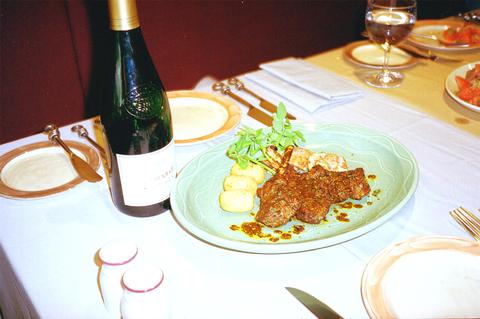The Latin ambiance is pretty popular these days, especially in music, but in cuisine, the food of South America is not well represented in Taipei. Salsa Bistro, tucked away in a lane off fashionable Anho Road, might be leading a new dining sensation with its small but unusual menu and probably the best selection of Chilean wines you are likely to find in this city.
Salsa Bistro's managing director and executive chef Ali Lai (賴奕岭) has created a menu that is representative of much South American cuisine with the exception of Brazil, which has its own separate culinary traditions. The food is served very stylishly, and is prepared and presented in a manner "a little more sophisticated than what is usual in South America." The careful control of cooking time to make sure that lamb chops are nice and tender is an example of this management, but overall, Lai says that the dishes are true to the originals.

PHOTO: IAN BARTHOLOMEW, TAIPEI TIMES
Although small, Salsa Bistro produces everything on the premises, and even the simplest dishes such as the sopaipilla (pumpkin bread with a cilantro and chili sauce) are outstanding in flavor and visual appeal. Other dishes such as the seviche (sword fish marinated in lemon juice) and the empanaditas make great entrees and also a great accompaniment to the extensive wine list. A light refreshing Tarapaca sauvignon blanc is a great way to get the meal going, and for the main meal, moving on the Tarapaca Maipo Valley gran reserva is a recipe for bliss.
Lai, a Chinese born in Chili, came back to Taipei to start an import business for Chilean wine, which explains the extensive wine list (only Chilean wines), which are very well priced and represents a wide range of what Chilean vineyards are now capable of. Most wines are between NT$1,000 to NT$1,500, and dollar for dollar, you are doing much better than with most French wines. Main courses are attractively laid out, but servings are substantial and you won't be walking away hungry.
One of the house specialties is the baked corn and meat pastry (NT$300), which you are unlikely to find anywhere else, but even seemingly common dishes such as roast chicken (NT$500) and grilled lamb chops (NT$580) have a unique twist to them, full of the flavor of unexpected spices.
Salsa's decor does not seek to overplay the Latin theme, with pleasant music of the Buena Vista Social Club variety and traditional pottery, but otherwise aims at modern elegance. Service is knowledgeable, friendly and efficient, and Lai or her staff are on hand to provide explanations as to the various dishes and wines. To finish off the meal, Salsa also has excellent coffee.
Address: 9, Lane 141, Anho Road, Sec. 1, Taipei (台北市安和路一段141巷9號)
Telephone: 02-27003060
Open: Noon to 2:30pm (lunch); 6pm to 11pm (dinner)
Average meal: NT$500
Details: English menu available. Credit cards accepted

On April 26, The Lancet published a letter from two doctors at Taichung-based China Medical University Hospital (CMUH) warning that “Taiwan’s Health Care System is on the Brink of Collapse.” The authors said that “Years of policy inaction and mismanagement of resources have led to the National Health Insurance system operating under unsustainable conditions.” The pushback was immediate. Errors in the paper were quickly identified and publicized, to discredit the authors (the hospital apologized). CNA reported that CMUH said the letter described Taiwan in 2021 as having 62 nurses per 10,000 people, when the correct number was 78 nurses per 10,000

As we live longer, our risk of cognitive impairment is increasing. How can we delay the onset of symptoms? Do we have to give up every indulgence or can small changes make a difference? We asked neurologists for tips on how to keep our brains healthy for life. TAKE CARE OF YOUR HEALTH “All of the sensible things that apply to bodily health apply to brain health,” says Suzanne O’Sullivan, a consultant in neurology at the National Hospital for Neurology and Neurosurgery in London, and the author of The Age of Diagnosis. “When you’re 20, you can get away with absolute

May 5 to May 11 What started out as friction between Taiwanese students at Taichung First High School and a Japanese head cook escalated dramatically over the first two weeks of May 1927. It began on April 30 when the cook’s wife knew that lotus starch used in that night’s dinner had rat feces in it, but failed to inform staff until the meal was already prepared. The students believed that her silence was intentional, and filed a complaint. The school’s Japanese administrators sided with the cook’s family, dismissing the students as troublemakers and clamping down on their freedoms — with

As Donald Trump’s executive order in March led to the shuttering of Voice of America (VOA) — the global broadcaster whose roots date back to the fight against Nazi propaganda — he quickly attracted support from figures not used to aligning themselves with any US administration. Trump had ordered the US Agency for Global Media, the federal agency that funds VOA and other groups promoting independent journalism overseas, to be “eliminated to the maximum extent consistent with applicable law.” The decision suddenly halted programming in 49 languages to more than 425 million people. In Moscow, Margarita Simonyan, the hardline editor-in-chief of the